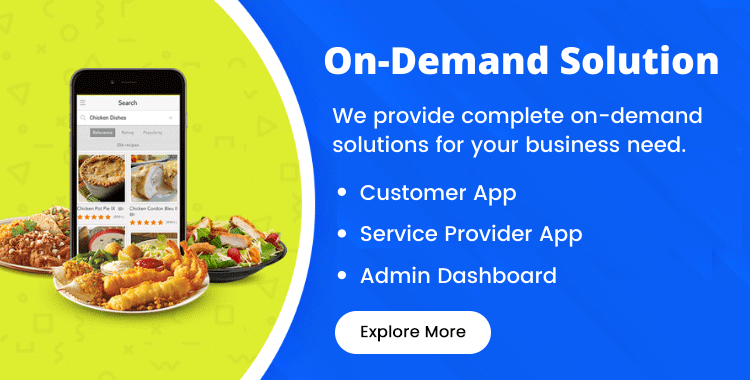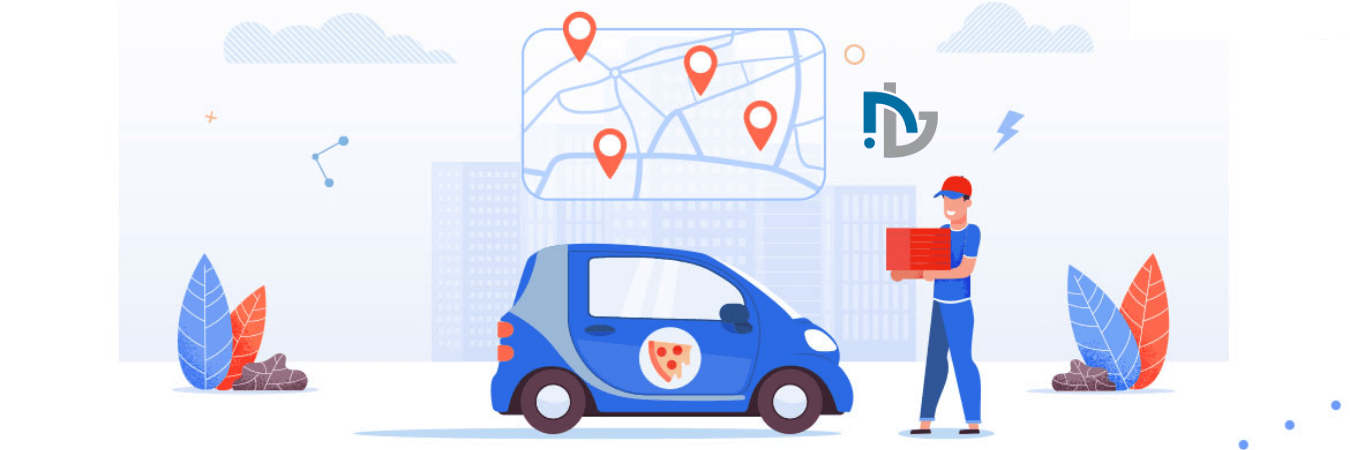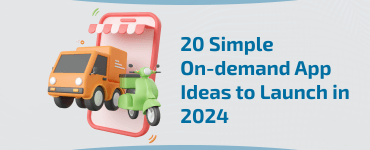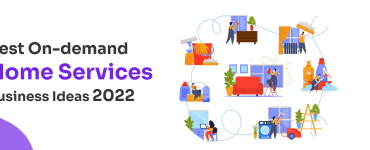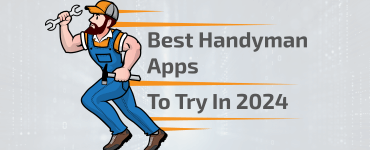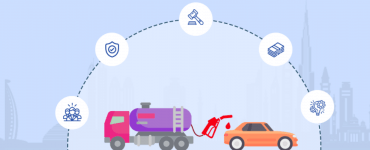With- Covid-19 has badly hit every industry vertical, but last-mile delivery app development has got a positive lift up. See the facts confirming the same.
- The global autonomous last-mile delivery market is expected to be valued at $15.70 billion in 2021 and is projected to reach $117.9 billion by 2030.
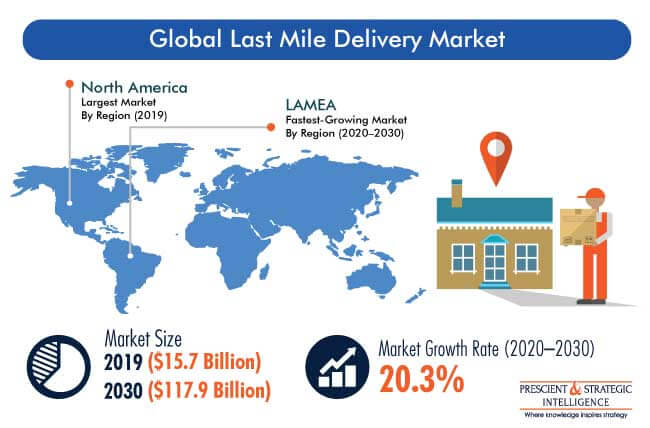
- The vehicle type, that’s ground delivery bots’ segment is expected to generate $4.56 billion in revenue, and is estimated to reach $34.90 billion by 2030.
- North America is projected as the highest revenue contributor, accounting for $4.83 billion by 2021, and is estimated to reach $39.94 billion by 2030.
Why is it so?
The last-mile delivery that acts as a user-facing part of the business facilitates expedited deliveries, enables efficient tracking, and forms an important part of the value chain. Moreover, it has become a cog in the Ecommerce wheel, that’s reducing logistics costs and delighting customers by meeting the need for speed.
However, everything is not so rosy. The last-mile delivery- the final leg of the supply chain is facing several challenges due to evolving trends, changing customer expectations, and modernization. It necessitates the companies to adopt the trends to prevent worse conditions and secure a bright future.
10 latest trends that Ecommerce is warmly embracing to optimize order fulfillment via the last-mile delivery app solution.
Zero-touch delivery
The concept of contactless delivery was unimaginable before coronavirus hit the world. Later, the pandemic has made social distancing, masking, and sanitization measures essential due to safety concerns. The last-mile delivery is no exception. The people ordering online expect contactless deliveries at the minimum, which in turn, helps Ecommerce win customers.
With complete digitization, the companies have digitized the delivery process from end-to-end, including digital invoices, proof of delivery, digital payment, and others.
Technology-driven bots making inroads
With human delivery agents, the accuracy level is not 100% as it’s realized with machines. This is the reason the Ecommerce giants are experimenting with machine agents such as drones or robots for order delivery. Amazon has spent more than 500 million dollars on drone delivery testing.
The new age of delivery services is gaining traction among retail giants as they are warmly embracing it. However, the customers’ acceptance rate for the technology is still unclear and the government has still not approved such a form of delivery, which’s expected to undergo a few regulations as well.
Urban warehouse development for rapid order fulfillment
In the age of instant gratification, the demands from customers to get the product faster and easier have increased by a great margin. The online Ecommerce stores have started meeting this need with a one-day or two-day delivery window. However, it’s impossible to meet the need unless warehouse management is done properly.
This is the reason, the companies have started building warehouses or fulfillment centers in the urban areas that reduce the transit time and easy access to laborers, thus deliveries are made faster. Amazon Prime is the popular example of the same that has made one-day delivery possible by building warehouses close to the urban areas.
Micro-warehousing to improve delivery operations
The same-day delivery or on-hour delivery windows becomes a headache for the Ecommerce development stores during the Holiday season or other occasions. This is where renting the commercial space for increased order fulfillment operations is a great solution. Building various micro-warehouses helps in keeping the stock of products and meeting the unexpected rise in demand.

The companies distribute the inventory in different micro warehouses to meet various types of delivery needs. For instance, the most popular products are kept in stock in the nearest micro-warehouse to fulfill the order at speed.
Building a fleet of vehicles for deliveries
Retail giants like- Amazon have made a move towards handling the order fulfillment on their own by creating a fleet of vehicles or preferring a hybrid model rather than outsourcing last-mile delivery services to third-party logistics. With insourcing deliveries, the company can handle the supply chain from end to end.
With a centralized dashboard, vehicle management, route optimization, vehicle location monitoring, and delivery updates are viewed under the last-mile delivery umbrella. Many companies are exploring this trend to better manage the business on the wheels for efficient last-mile deliveries.
Location intelligence has made tracking smarter
Undoubtedly, with access to everything in a single tap, the customers expect to track the orders right from the moment it’s shipped and in transit, to the time it’s delivered. Thanks to technology that has made it possible by embedding sensors in the packages. The smart technology allows customers to track temperature, humidity, pressure, and other things in real-time so that they get to know about food, medicines, or spirits quality maintained.

In the same vein, the warehouse and third-party logistics can better take care of orders by planning the package based on the weather information received through technology advancement. The technology helps a ton in improving customers’ visibility into order fulfillment and increasing business’ financial gains.
Read more: Comprehensive Guide For Your Ecommerce Store Development
Upselling by turning drivers into salesman
The brick-and-mortars have experienced a good time in pursuing the customers to purchase more. The online stores have also invested bundles to increase the order volume through cross-selling, smart recommendations, and up-selling. However, the companies are exploring new avenues of increasing basket size when the product delivery is done.
Yes, you got it right. The delivery agents a returned into salesman where they keep stock of all the products in the truck that customers generally order by analyzing the customers’ purchase history. However, the concept of the mobile warehouse is still in the nascent stage because of the associated issues such as payment processing, accounting, taking care of returns, and others.
Read More : Mobile Apps Are Transforming The Transport Industry
Autonomous vehicles are suspected
In the corona outbreak, we have witnessed the shortage of laborers and drivers due to enormous risks that exist outside. That’s where driverless vehicles fill the void with 24/7 delivery possibility at a reduced cost alongside ensuring a higher level of accuracy. Although advanced technology leverage is a must to resolve the operational issues. Taking care of government regulations is also important else it put the businesses fall into serious jurisdiction issues.
Amazon is the best instance of it that has placed a bet on self-driving vehicles with huge spending. The robot- Amazon Scout is expected to debut in the market in the year 2021.
Analytics taking the costs southwards
With unexpected changes in weather, road, and traffic conditions, the companies find it difficult to fulfill the order requirements on time and even, increases the order fulfillment cost too. However, when the companies use intelligent analytics tools across every touchpoint of the supply chain, the minor changes diminish the cost without compromising the user experience.
This way last-mile delivery service providers can meet the one-day or one-hour delivery possible without costing too much to the company.
Utilization of crowdsourcing
The last-mile delivery service providers have begun utilizing gig economy and crowdsourcing for the Uberification of the fulfillment space. In this technology-based solution, the independent delivery vehicle owners get connected to enable order deliveries in specific areas. With fewer barriers to entry, the technology doesn’t require any type of investment.
However, the limited visibility issue associated with crowdsourcing pops up the challenges as the companies are left with no option other than banking on the independent contractors. When any mistake is made by the drivers, the company will be liable for everything.
The last word for last-mile delivery
The burgeoning last-mile delivery space is experiencing difficulty in meeting the demand for fast and efficient deliveries with growing scope and complexity. Optimizing the last-mile delivery services in sync with the latest trends is a smart decision. However, there are so many trends that are gaining traction, but it’s not essential to embrace them all at once. Don’t hang fire! Innovate your Ecommerce last-mile delivery system with technological advancements that your customers need. Let’s do it.
